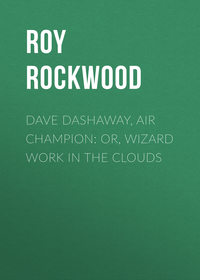 полная версия
полная версияDave Fearless and the Cave of Mystery: or, Adrift on the Pacific

Roy Rockwood
Dave Fearless and the Cave of Mystery; or, Adrift on the Pacific
CHAPTER I
SPLENDID FORTUNE
"It's gone! It's gone!"
"What is gone, Dave?"
"The treasure, Bob."
"But it was on board-in the boxes."
"No-those boxes are filled with old iron and lead. We have been tricked, robbed! After all our trouble, hardship, and peril, I fear that the golden reward we counted on so grandly has slipped from our grasp."
It was on the deck of the Swallow, moored in the harbor of a far-away Pacific Ocean tropical island, that Dave Fearless spoke. He had just rushed up from the cabin in a great state of excitement.
Below loud, anxious, and angry voices sounded. As one after another of the officers and sailors appeared on the deck, all of them looked pale and perturbed.
What might be called a terrific, an overwhelming discovery had just been made by Captain Paul Broadbeam and by Dave's father, Amos Fearless, the veteran ocean diver.
For two weeks, after a hard battle with the sea and its monsters, after fighting savages and piratical enemies, the beautiful steamer, the Swallow, had plowed through sun-tipped waves, favored by gentle breezes, homeward-bound.
Every heart on board had been light and happy. Labeled and sealed on the sandy floor of the ballast room, lay four boxes believed to contain over half a million dollars in gold coin.
Legally this vast treasure belonged to Amos and Dave Fearless, father and son. To those who had aided and protected them, however, from Doctor Barrell, on board the Swallow to make deep-sea soundings and secure specimens of rare marine monsters for the United States Government, down to Bob Vilett, Dave's chosen chum and the ambitious young assistant engineer of the vessel, every soul on board knew that when they reached San Francisco, the generous ocean diver and his son would make a most liberal division of the splendid fortune they had fished up in mid-ocean.
As said, the serenity of these fond hopes was now rudely blasted. Dave, rushing up on deck quite pale and agitated, had made the announcement that brought Bob to his feet with a shock.
They were two sturdy boys. The flavor of the briny deep was manifest in their bronzed faces, their attire, their clear bright eyes, and sinewy muscles. They had known hardship and peril such as make men resolute and brave. Although Dave was deeply distressed, determination rather than despair was indicated in the way in which he took the bad, bad news now being conveyed with lightning speed, mostly with depressing effect, all through the ship.
Bob Vilett steadied himself against a capstan and stared in silence at his chum. Dave's hand grasped the bow rail with an iron grip, as if thereby seeking to relieve his tense feelings. His eyes were directed away from Bob, away from the ship, fixedly, almost sternly, scanning the ocean stretch that spread almost inimitably towards the west. It seemed as if mentally he was going back over the long course they had just pursued, never dreaming that they were carrying a ballast of worthless old junk instead of the royal fortune on which they had fondly counted.
"Well, all I've got to say," observed Bob at length, with a great sigh, "is that it's pretty tough."
"I fancy," responded Dave, in a set, thoughtful way, "it's a case of three times and out. We fished it up-one. We've lost it-two. We must find it again-three. That's all."
"You're dreaming!" vociferated Bob. "Say, Dave Fearless, you're a genius and a worker, but if you mean that there is the least hope in the world in going back over a course of over a thousand miles hunting up men with a two weeks' start of us-desperate men, too-scouring a trackless ocean for fellows who have to hide, and know how to do it, why, it's-bosh!"
"Bob Vilett," said Dave, with set lip and unflinching eye, "we are only boys, but we have tried to act like men, and Captain Broadbeam respects us for it. We have his confidence. He is old, not much of a thinker, but brave as a lion and ready for any honest, logical suggestion. Here's a dilemma, a big one. You and I-young, quick, ardent-we must think for him. We have been robbed. We must catch the thieves. We must recover that treasure. Where's the best and surest, and the quickest way to do it? Put on your thinking-cap, Bob, and try and do some of the hardest brain work of your life."
"Hold on-where are you going?" demanded Bob, as his chum went away over into a remote corner of the bow and sat down on an isolated water barrel.
But Dave only waved his hand peremptorily, almost irritably, at Bob. His chum knew that it would be useless to renew the conversation just now. He had seen Dave in just such a mood on other occasions-it was when affairs were going wrong and needed straightening out.
"All right," murmured Bob resignedly, moving over to where some glum-faced sailors were discussing the disappointment of the hour in a group. "It won't hurt any of us to have Dave Fearless do some of that tall thinking of his. Oh, dear! All that money gone. And after all we went through to get it!"
Meanwhile Dave Fearless sat posed like a statue. His gaze was fixed beyond the little inlet where the Swallow was moored, straight across the unbroken ocean stretch. His thoughts just then, however, were not fixed on the west, but rather on the east. A vivid panorama of his stirring adventures of the past few months seemed spread out to his mental eye. They went back to the start of what the present moment seemed to be the finish.
Dave's home was at Quanatack, along the coast of Long Island Sound. There for many years his father had been an expert master diver, and Dave himself, reared beside the sea and loving it, had done service as a lighthouse assistant.
In the first volume of the present series, entitled "The Rival Ocean Divers," it was told how they one day learned that they were direct heirs of the Washington family, who twenty years previous had acquired a fortune of nearly a million dollars in China. This, all in gold coin, had been shipped in the Happy Hour for San Francisco. A storm overtook the vessel, which sunk in two miles of water in mid-ocean with the treasure aboard.
Amos Fearless secured a chart showing the exact location of the wreck. Unfortunately two distant relatives, a miserly trickster named Lem Hankers and his worthless son, Bart, learned of the sunken treasure, too. They proceeded to San Francisco and were joined by a rascally partner named Pete Rackley. The trio chartered from a wrecking company the Raven, Captain Nesik in command, and engaged a professional diver named Cal Vixen.
The Fearlesses, learning of this, hastened their plans. An old friend of the diver, Captain Broadbeam, was just then starting out with the Swallow, to convey a well-known scientist from Washington to mid-ocean. The Swallow was equipped with the finest diving bells and apparatus for capturing and preserving rare monsters of the deep. Broadbeam agreed to incidentally assist Amos Fearless in the search for the sunken treasure.
The rival divers located this at about the same time. Thrilling experiences followed, terrific battles with submarine monsters, hair-breadth perils on the ocean bed. The Hankers and their diver after several efforts gave up the quest. Dave and his father stuck at it until one day they located the hull of the Happy Hour. Bag after bag of gold they stored in their Costell diving bell, until all the treasure was conveyed safely to the hold of the Swallow. Then they set sail for home.
Pete Rackley had managed to secrete himself aboard. He disabled the machinery of the Swallow. This was the starting-point of a new series of adventures as related in our second volume, "The Cruise of the Treasure Ship."
It now became plot and warfare on the part of the disgruntled Hankers and their friends. The result was that one dark and foggy night the schemers succeeded in stealing aboard of the Swallow. Captain Broadbeam, Bob Vilett, Doctor Barrell, and the Fearlesses were put ashore on a lonely island, and the Raven steamed away with the captured convoy.
A sixth person was also marooned. This was one Pat Stoodles, a whimsical Irishman, who had been previously rescued by the Swallow from this same island, where for several years he had been the king of its savage inhabitants.
"The Cruise of the Treasure Ship" has told graphically of the many adventures of the marooned. Stoodles reassumed his kingship temporarily and helped his friends out of many a sore dilemma. A cyclone and an earthquake drove all hands to a neighboring island. Finally Dave and Bob discovered the Swallow, somewhat dismantled, lying off the coast of the island. They boarded her to find Mr. Drake, the boatswain, Mike Conners, the cook, and Ben Adams, the engineer, handcuffed in the cabin. These men had refused to navigate the Swallow for Captain Nesik. They told how the cyclone had parted the two vessels and the Swallow had been driven to her present isolated moorings. They told also of the four boxes into which they had seen the Hankers place the sunken treasure.
For a second time, believing their enemies and the Raven lost in the storm, the Fearless party started homeward. Incidentally they had enabled a worthy young fellow named Henry Dale to earn a large sum by towing with them a lost derelict ship. This they had turned over to an ocean liner they met. Then, the Swallow needing some repairs, they had headed for Minotaur Island, their present port of moorage.
This island had originally belonged to the government of Chili. Just now, however, it was claimed by Peru, and was also in a certain state of rebellion. The governor was a miserly and tricky individual, and had demanded a large sum from Captain Broadbeam before he would let him moor the Swallow.
He sent out as pilot a wretched, drunken fellow, who ran the Swallow into an obscure creek where she struck some obstacle, tearing a hole in her hull.
Thus disabled, Captain Broadbeam found it necessary to shift the various articles in the hold. The four sealed boxes were removed, and Amos Fearless naturally suggested that they take a look at their golden fortune.
Ten minutes later the startling discovery was made which has been recorded in the opening lines of the present chapter-
The great Washington fortune was not, as had all along been supposed, aboard of the Swallow.
CHAPTER II
FOUL PLAY
Captain Paul Broadbeam came up on deck, his face red as a peony, his brow dark as a thundercloud.
He was manifestly irritated. In his great foghorn bass voice he gave out a dozen quick orders. His evident intention was to break up the little groups discussing the happening of the hour.
"Avast there!" he roared to a special set of four seamen they had taken on at Mercury Island a week previous. "No mutinous confabs allowed here. If you expected something never promised, that's your lookout. Those that can't be satisfied with plain square wages can take their kits ashore."
Amos Fearless had followed the captain from the cabin. The veteran ocean diver looked greatly disappointed and distressed. He made out Dave and went over to where he sat.
"Well, my son," he said, disturbing Dave's deep reverie by placing a trembling hand on his shoulder, "this is a bad piece of news."
"Yes, father," replied Dave gravely.
"We've been big fools," continued Amos Fearless, with a sigh and a dejected shake of his head. "Might better have kept to our sure pay back at Quanatack. We are only humble folk, Dave, and should have been satisfied with our lot. Might have known million-dollar fortunes don't come falling on such as we, except in story-books."
"Wrong, father!" said Dave sharply. "I don't look at it that way at all. We are the legal Washington heirs, and had a right to expect what was our due. It was a clear-cut, honest piece of business."
"Well, it's turned out worse than nothing for us."
"I don't see that, either," observed Dave. "We went at the matter right. We located the sunken treasure. Someone has stolen it. Surely, father, you don't mean to tell me that you will fold your hands meekly and make no effort to recover the fortune we have worked so hard for? Why, father," declared Dave, with spirit, "all we may have to go through can't begin to be as difficult and dangerous as what we have already accomplished. It looks simple and plain to me-our duty."
"Does it now?" murmured the old diver in a thoughtful way.
"Yes. Someone stole that treasure, and of course it was the Hankers and Captain Nesik and that crew of rascals. Well, father, they can't spend it on a desert island in mid-ocean, can they?"
"Why, I suppose not," said the diver.
"Certainly not. They will try to get back to civilization. Now I have been thinking out the whole matter. Mr. Drake, our boatswain, saw the Hankers make a great show of putting the gold into the four wooden boxes. Now we find out that this was just a pretense to deceive the crew of the Raven. Later, of course, they secretly removed it. To where, father? To the Raven? If so, they ran into a bad predicament. From what the Island Windjammers told Pat Stoodles the last they saw of the Raven she was scudding along in the cyclone, completely disabled. If she stranded, of course they hurried out the treasure before she sank. Then it is hidden somewhere among those islands where we had our hard fight for existence. The survivors are either waiting there hoping some ship will stray their way, or they fixed up the Raven and are making for the South American coast."
"That's a pretty long talk, but a sensible one, Dave," said the old diver, brightening up a good deal. "Go ahead, my son-supposing all this?"
"Yes, father," said Dave, "supposing all this."
"Well, what then?"
"Why, the next thing is to prove I am right or partly right. We must go back to the Windjammers' Island and hunt for a trace of the Raven. Stoodles can make his old subjects, the natives, tell what they know. If we find that the Raven was not wrecked and has made for the South American coast, then we must put right after them."
"Dave, you give me a good deal of courage," said Amos Fearless-"you make me ashamed of my despair. I'm old, though, you see, and this is a big disappointment."
"Don't you fret, father. I feel certain that prompt work will soon put us on the track of the treasure."
"I'll speak to Captain Broadbeam right away," said the old diver, and Dave was pleased to see how nimbly his father started off, encouraged and hopeful from the little talk he had given him.
Bob Vilett had been watching Dave all this time. The young diver did not sit meditating any longer. He had thought out what had to be done. Now he must decide how to do it. He paced up and down with smart steps. Bob started to rejoin him. There was an interruption.
A man half-dressed, one boot on and carrying the other in his hand, came banging up the cabin steps.
"Bad cess to it! Begorra! Who tuk it-who tuk it?" he shouted.
This was Pat Stoodles. He seemed to have just awakened and to have learned of the astounding discovery of the hour. Making out Dave, who was a great favorite with him, Stoodles sprinted with his long limbs across the deck.
"Wirra, now, me broth of a boy, tell me it's false!" implored Pat.
"If you mean that we've got four boxes of junk aboard instead of gold," said Dave, "unfortunately it's true."
"Acushla! luk at that now," groaned Stoodles, throwing up his hands in sheer dismay. "And I was to have had a thousand dollars."
"More than that, Mr. Stoodles," answered Dave. "You have been one of our good loyal friends, and my father has often planned starting you in a nice paying business, had we reached San Francisco with the treasure."
"Hear that, now!" cried Stoodles. "Didn't I write that same thing to my brother in New York? Didn't I tell him I'd be home, loaded down with gold? I sent the letter from Mercury Island. And now I must write him again, telling him it was all a poor foolish old fellow's dream. All I've got is my losht dignity as king of the Windjammers."
Poor Stoodles tore his sparse hair and looked the picture of gloom and discontent.
"I'll write to my brother at once," he resumed. "Have you a postage stamp to spare, Dave?"
"They use the Chilian stamps here, I believe," replied Dave. "You will have to go to the town to get one, Mr. Stoodles."
"I can accommodate you," spoke a brisk, pleasant voice promptly.
All hands turned sharply to view the speaker. Dave, in some surprise, saw a bronzed bright-faced young man coming up a rope ladder swung over the side of the Swallow.
Dave had never seen him before. The newcomer had rowed up the creek in a skiff. Looking down into this, Dave saw an artist's sketching outfit, also a camera.
"Excuse me," said this newcomer, "if I am intruding here. I am a traveling artist out for health and views. Thought I'd take a picture of your ship, if you don't object."
"Not in the least," answered Dave courteously, although the request came at a time when his thoughts were absorbed with more important matters.
"And again," said the young fellow, "I wanted to see some home faces and hear home voices. My name is Adair. I live in Vermont. By the way, though," he continued to Stoodles, taking out a wallet, "you asked for a postage stamp, I believe?"
The speaker ran over the compartments in the wallet. A stray gust of wind caught a little paper fragment it held, blew it up into the air, and Stoodles caught it just as it was being carried over the rail into the water.
"Good," said Adair gratefully. "I wouldn't like to lose that, I can tell you."
"A postage stamp, too, isn't it?" asked Stoodles, looking at it.
"Yes," nodded Adair, "and a pretty valuable one. You see it is canceled and ragged. That don't matter. For all that, the little scrap of paper is worth over two hundred dollars."
"You don't tell me!" gasped Stoodles, staring at the stamp vaguely.
"That's right," insisted Adair. "Here's an island stamp," he added, extending one to Pat. "No, don't bother making change for that trifle. Want to see it?" continued the young man, extending the canceled stamp to Dave.
"I used to have quite a collection myself at home," explained Dave, glancing with interest at the canceled stamp. "Morania? I never heard of that."
"No, a short and solemn history, that of Morania," said Adair. "It was one of the South Sea islands with a population of about one thousand natives. Some shrewd Yankee got their king to establish a post office, so he could sell the government a stamp-printing outfit. There wasn't much business, but one day Morania without any warning was swept to destruction by a tidal wave. Very few letters had ever been sent out. Of course the few stamps to be had became immensely valuable. I have managed to pick up four of them in my travels. I value them at one thousand dollars."
"Why-" said Dave, with a sudden start, and glanced at Stoodles queerly. Whatever the artist's story had suggested, however, Dave did not have time to explain. Captain Broadbeam came storming by like a mad lion.
"There's foul work here," he roared-"foul work all around. First that stupid, drunken pilot runs us afoul of a snag and stove a hole in our bottom. Now that rascally governor sends word asking a small fortune for the timber and truck and men to mend up the Swallow. All right. Pipe the crew, bosun. We'll have to overhaul the keel ourselves and do the best mending we can. Then I'm out of these latitudes mighty quick, I can tell you!"
"Don't he know?" inquired Adair, stepping closer to Dave's side and speaking confidentially.
"Know what?" inquired Dave, in some surprise.
"Why, that the snag he ran into, or rather the snag the pilot ran him into, was a sunken brig that everybody on the island has known for years blocked the creek bottom."
"Is that so?" said Dave.
"As I get it from the talk of the natives here, yes," said Adair.
"Did the pilot know it was there?" asked Dave.
"Could he miss knowing it?" demanded Adair. "Truth is, I came down here with a sort of fellow-feeling in my mind for you people. The governor here and his friends bleed every American they get hold of. They are a precious set of thieves, and when I heard of your predicament I wondered what new mischief they were up to."
"Then," said Dave, in a startled way, "you mean to insinuate that the pilot ran the Swallow into her present fix purposely?"
"I do," nodded Adair.
"Why?" demanded Dave, with a quick catch of excitement in his voice-"why did he do it?"
CHAPTER III
MR. SCHMITT-SCHMITT
"Yes," cried Bob Vilett impulsively. "Why did the pilot try to wreck the Swallow?"
The young engineer had been an interested listener to the conversation that had passed between Dave and Adair. The latter shrugged his shoulders.
"Sheer natural meanness and hatred of foreigners," he said, "or they mean to delay you."
"Why should they delay us?" protested Dave.
"To bleed you. The longer you stay here the more they will get out of you. They overcharge for everything, make you pay, and fine you, and make you trouble on every little technicality of the law that wretched governor can dig up."
"Why, that's abominable!" declared Bob.
"You see, the island here is in a squabble between Chili and Peru," explained the artist. "The governor has set up an independent dictatorship. He knows it can't continue, so he is hurrying to make all the money he can out of his position while it lasts."
"It looks as if you have given us some pretty straight information," said Dave seriously. "I must tell Captain Broadbeam. No," Dave checked himself. "I'll wait till I am sure of what you suspect, and look a little deeper into this matter."
"There's a group I'd like to take," interrupted Adair, glancing with an artist's fine interest at the sailors of the Swallow getting some tackle out to keel the ship.
He seized a boathook and, leaning over the side, caught its end in his camera outfit lying in the skiff below.
"There are some island views, if you would like to look them over," he observed, unstrapping a square portfolio from the camera rack.
Adair set up his portable tripod and focussed the group amidships. Dave turned over the photographs in the portfolio.
"You'll find a pretty good picture of that rascally pilot," said Adair. "Third one, I think."
"I've got it," nodded Dave, "and-say!"
So violent was this ejaculation that Adair was startled into snapping the camera shutter before he was quite ready.
"You've spoiled my picture for me," he said, but not at all crossly. "Why, my friend, what's struck you?"
Dave was wrought up all out of the common. Generally cool and level-headed, his nerves seemed to have suddenly gone to pieces.
He had dropped the portfolio, and Bob was scrambling to preserve its scattered contents. Dave himself held a single photograph in one hand; with the other he was pulling Adair by the arm. He drew the surprised artist out of direct range of the others.
"Look here," he said, with difficulty steadying his trembling voice, "this picture?"
"Yes," nodded Adair, with a casual glance at the photograph-"our friend, the pilot."
"There is no trouble recognizing him," said Dave. "It's the other fellow in the picture, I mean."
"Oh, do you know him?"
"I think I do," answered Dave, in a suppressed but intense tone.
"Likely. He's been haunting the harbors here for several days. I happened to see the two sitting on that bench in front of the pilot's shanty, and took a shot."
Dave, looking worried and hopeful, in doubt and suspicious, by turns, kept scanning the photograph.
"Who is the man, anyhow?" he asked, placing his finger on the pilot's companion.
"Schmitt-Schmitt, he calls himself-from the Dutch West Indies, he says."
"He calls himself that, does he?" said Dave thoughtfully, "and he is a Dutchman?"







